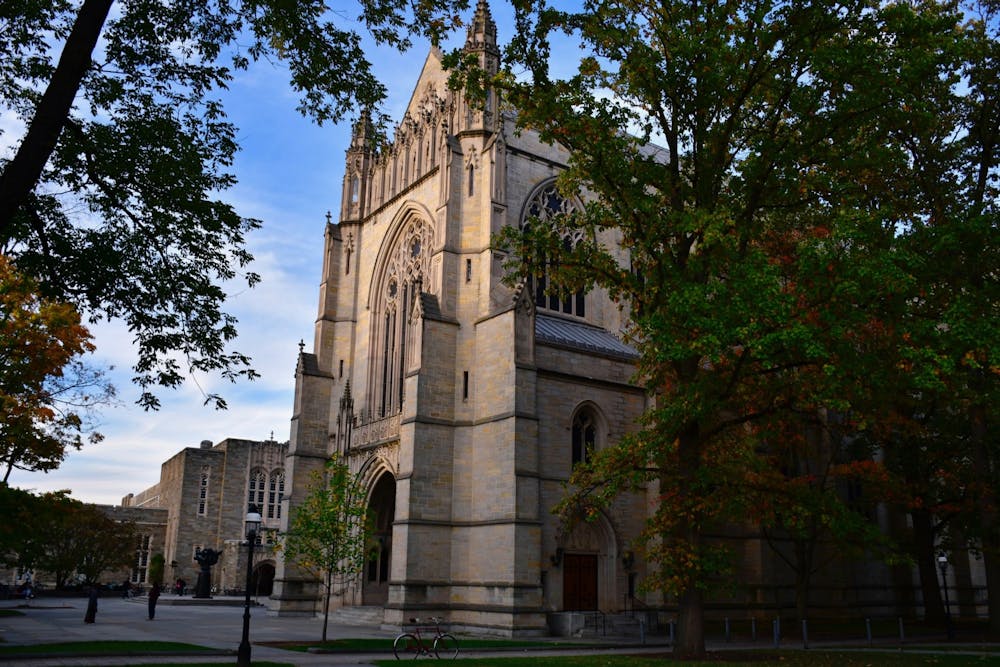In the gloriously queer “Take Me to Church,” Hozier intones, “The only Heaven I’ll be sent to / Is when I’m alone with you / I was born sick, but I love it.” In terms of lyrical expressions of erotic liberation, it’s hard to beat.
The line has been on my mind over the last several days after seeing posters, some of which are religiously oriented, in Frist Campus Center — and elsewhere on campus — advocating for sexual diversity and acceptance of queer people; presumably, the posters were in response to a campus event, “Sexuality, Integrity, and the University,” facilitated by the Love and Fidelity Network, which occurred on Nov. 8 and 9.
The event aimed to “[bring] together hundreds of students, scholars, and experts from across the country to equip the college students with the best academic resources and arguments they need to bring the message of love and fidelity back to their campuses.” (I will not opine on the event itself, or its alleged heterosexist undertones, as I did not attend.)
Many of the protest posters conceptualized Christianity as a justification for queer liberation, rather than as a mechanism of condemnation. One poster, hung on a flag pole in the McCosh courtyard, fittingly adjacent to the University chapel, asserted, “JESUS WAS A brown queer socialist,” and urged others to “Open the Book [the Bible].” Others cited religion as well: one called for the separation of “CHURCH and HATE.” Another argued that “QUEER JOY IS A SACRED REVOLUTIONARY CHOICE.”
Amen to them all.
On a personal note, I was raised Catholic and continue to embrace many of the teachings of Jesus. Ever since high school, though, I have been disgusted by the Church’s sustained homophobia, sex-negativity, and basic ideological cowardice — as well as its tragic failure to confront sexual abuse. But I have been heartened by the progressive Christian activism, as well as the progressive activism rooted in a host of other faiths, I have witnessed at Princeton — including, of course, the protest of the Love and Fidelity event.
Queering the Bible, and other religious texts, is a revolutionary exercise and an assertion of true love. Embracing the (rather obvious) queerness of the Bible and the life of Jesus allows Christianity to be a source of radical liberation, which I believe it was meant to be, rather than a philosophy rooted in shame, oppression, and anti-erotic authoritarianism. Queering the Bible, in short, redeems Christianity, and it is high time for the religion’s redemption.
At the same time, I can’t help but wonder if queer activism should consciously subvert heteronormative principles — Christian or otherwise — instead of attempting to reconcile queerness with these principles.

Leo Bersani’s canonical queer-studies text, “Is the Rectum a Grave?,” published in 1987, may provide a blueprint for solving this dilemma.
Bersani memorably argued that “if the rectum is the grave in which the masculine ideal (an ideal shared—differently—by men and women) of proud subjectivity is buried, then it should be celebrated for its very potential for death.”
Bersani was not referring to religion here — in other words, he was not examining the “Christian ideal.” Rather, he was arguing that during anal intercourse, a man loses his subjective claim to normative, masculine power and control. Bersani thought this supposed emasculation should be embraced, and that gay intimacy should not be reconciled with oppressive heterosexual, monogamous, patriarchal, anti-feminist mores.
Perhaps Bersani’s scholarship can inform queer Christian activism.

The notion that Jesus was queer or that “QUEER JOY IS A SACRED REVOLUTIONARY CHOICE” are empowering messages. Yet the sociopolitical rights and erotic liberation of queer Christians should not be contingent upon Jesus’ sexual orientation or to what extent queer joy is expressed within the normatively constructed bounds of sacredness. Even if Jesus were straight, and even if queer joy manifests in blasphemous fashions (whatever that means), queer people should still be free, loved, and embraced for their queerness.
More broadly, queer Christian activists should not be obligated to intellectually prove that their queerness and Christian identity are not in moral contradiction. The beautiful existence of queer Christians already confirms that queerness and Christianity are indeed compatible. There’s no need to dignify homophobic ideologies rooted in pseudo-Christian orthodoxies with effortful responses.
To borrow Bersani’s logical framework, if some consider queerness a sin, then it should be celebrated for its very potential for sinfulness.
Samuel Aftel is a senior from East Northport, N.Y. He can be reached at saftel@princeton.edu.








